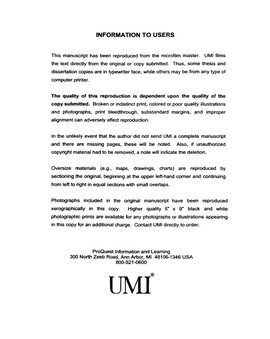| dc.contributor.advisor | Kramer, Eric, | en_US |
| dc.contributor.author | Iwakuma, Miho. | en_US |
| dc.date.accessioned | 2013-08-16T12:18:31Z | |
| dc.date.available | 2013-08-16T12:18:31Z | |
| dc.date.issued | 2002 | en_US |
| dc.identifier.uri | https://hdl.handle.net/11244/434 | |
| dc.description.abstract | Throughout their lives, people make various kinds of adjustments. Most people are capable of making adjustments in order to survive challenging experiences. This fact is especially true for newly disabled individuals whose lives have been turned upside down. An adjustment to a severe disability is accompanied by significant psychological (lowered self-esteem), physical (restricted mobility), and social (changed social identity, "disabled") changes, and such sudden changes also require short-term (physical) and long-term (psychological and social) adjustments. In other words, the investigation of adjustment to a disability gives social scientists a unique opportunity to study various facets of human adjustment strategies and processes. This research focuses on how people with disabilities in Japan have changed their worlds after acquiring a disability. The researcher used ethnography and an interview method to follow the participants' disability transformations for three years. Several themes emerged, such as information pooling places for the disabled, interacting with others with disability and adjustment to the disability, negotiation with the non-disabled, an early going-out as a prologue to the disability adjustment, changed perceptions toward the wheelchair, and changed communication with others, just name few. Moreover, based on these themes, this researcher generated three binary oppositions. They are integration-separation, defying disability-accepting disability, and independence-dependence. In the end, it was concluded that communication was the main vehicle for the disability adjustment. The researcher summed up that communication with others facilitated the participants' disability transformations, and in return, they adjusted their communication as they adjusted to their disability. | en_US |
| dc.format.extent | vii, 159 leaves ; | en_US |
| dc.subject | Sociology of disability Japan. | en_US |
| dc.subject | People with disabilities Japan. | en_US |
| dc.subject | Speech Communication. | en_US |
| dc.subject | Adjustment (Psychology) Japan. | en_US |
| dc.title | An adjustment process and communication dilemma of people with disabilities in Japan. | en_US |
| dc.type | Thesis | en_US |
| dc.thesis.degree | Ph.D. | en_US |
| dc.thesis.degreeDiscipline | Department of Communication | en_US |
| dc.note | Source: Dissertation Abstracts International, Volume: 63-02, Section: A, page: 0420. | en_US |
| dc.note | Major Professor: Eric Kramer. | en_US |
| ou.identifier | (UMI)AAI3042503 | en_US |
| ou.group | College of Arts and Sciences::Department of Communication | |
